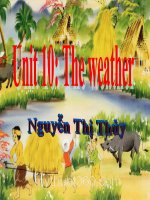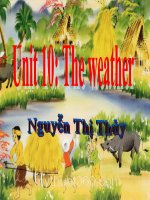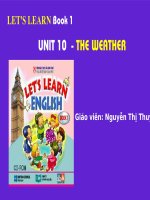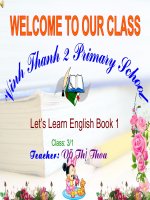unit 5 the media tiếng anh 9 sách cũ nguyễn văn liệt thư viện giáo án điện tử
Bạn đang xem bản rút gọn của tài liệu. Xem và tải ngay bản đầy đủ của tài liệu tại đây (109.12 KB, 3 trang )
<span class='text_page_counter'>(1)</span><div class='page_container' data-page=1>
Period: 31
<b>UNIT 5: THE MEDIA</b>
<b>WRITE</b>
<b>I. Objectives: </b>
<i><b>1. Knowledge, Skills, Attitude: </b></i>
<i><b>a. Knowledge:</b></i>
- By the end of the lesson, students will be able to write the passage about the benefits of the Internet.
<i><b>- Vocabulary: </b></i> Related to the media.
<i><b>- Grammar: </b></i> Present simple tense.
<i><b>b. Skills: listening, speaking, reading and writing</b></i>
<i><b>c. Attitude: Ss will be educated about choosing suitable means of media.</b></i>
<i><b>2. Capacity is formed and developed for students.</b></i>
- Self-learning capability.
- Communicative competence
- Cooperation capacity
<b>II. Preparation</b>
<i><b>1. Teacher: lesson plane, book, color chalks</b></i>
<i><b>2. Students: books, notebooks, pen, ruler …</b></i>
<b>III. Students’ activities</b>
<i><b>1. Warm-up (5’)</b></i>
<b>Teacher’s and students’ activities</b> <b>Content</b>
- T asks, Ss answer the questions.
- T corrects and gives marks if necessary.
Do you think the Internet is very useful? Why?
<i><b>2. Knowledge formation activities (36’)</b></i>
- T introduces the situation and explains the
requirement.
- Ss listen to teacher.
- Ss read part 5 again.
- Ss work in pairs: find more ideas about the
benefits of the Internet.
- T supply Ss more ideas about the benefits of
the Internet.
<i><b>VI. Write</b></i>
<i>* Ss write a passage about the benefits of the Internet.</i>
Read the forum on the Internet in the reading text
again. (5.Read). Write a passage about the benefits of
the Internet. You can use the following cues.
<i>Suggested ideas :</i>
<b>Benefits of the Internet:</b>
- A very fast and convenient way to get information.
- A very fast and cheap way to communicate with
your friends/relatives by means of e-mail, chatting,
webcam, etc.
- A very updated source of information : you can get
the lasted local or global news, you can check weather
conditions before you go camping/fishing/outdoors …
you can find a timetable and maps of the buses you
want to take; you can book your tickets for the next
concert/soccer match/trip/hotel, … .
- A diversified source of entertainment: you can listen
to music, to the radio, watch videos, play games, read
novels/poems, do virtual sightseeing, etc.
- A rich source of educational materials/courses: you
can learn English, look up new words in a dictionary,
take a training/learning course, etc.
</div>
<span class='text_page_counter'>(2)</span><div class='page_container' data-page=2>
- Ss compare their writings in pairs.
- T calls some Ss to read their writing
before the class.
- T checks and corrects students’ mistakes
if necessary.
- T asks, Ss answer the questions. Questions :
- Do you often use the Internet? What for?
- How many hours a day do you use the Internet?
<i><b>3. Consolidation 4’</b></i>
T emphasizes the benefits of the Internet, Ss pay attention to teacher.
<b>IV. Experience:</b>
………
………
………
Period: 32
<b>UNIT 5: THE MEDIA</b>
<b>LANGUAGE FOCUS</b>
<b>I. Objectives:</b>
<i><b>1. Knowledge, Skills, Attitude: </b></i>
<i><b>a. Knowledge: </b></i>
- Ss will be able to consolidate their knowledge of tag questions and gerund after some verbs.
<i><b>- Vocabulary: </b></i>Related to media
<i><b>- Grammar: Tag questions and gerund after some verbs.</b></i>
<i><b>b. Skills: listening, speaking, reading and writing</b></i>
<i><b>c. Attitude: Working hard.</b></i>
<i><b>2. Capacity can be formed and developed for students </b></i>
- Self-learning capability.
- Cooperation capacity
- Communicative competence
<b>II. Preparation</b>
<i><b>1. Teacher: lesson plane, book, color chalks, pictures, cassette and tape</b></i>
<i><b>2. Students: books, notebooks, pen, ruler …</b></i>
<b>III. Students’ activities</b>
<i><b>1. Warm up</b></i>
<i><b>2. Knowledge formation activities (41’)</b></i>
<b>Teacher’s nad Ss’ activities</b> <b>Content</b>
- T explains the requirement.
- T gives some examples and explains the
way to make tag questions.
- Ss do the exercises in pairs.
- T calls some pairs of Ss to role play the
dialogues before the class.
- T checks and corrects the mistakes if
necessary.
<b>1. Complete the dialogue with the correct tag.</b>
<i>* Ss remember the way to use tag question.</i>
<b>EX:</b>
- You have read this article on the website, haven’t you?
- You didn’t watch a new film last night, did you?
<b>Answer keys</b>
b. didn’t he? c. wasn’t it?
d. do you? e. aren’t we?
- T explains the requirement.
- T gives some examples and explains the
way to make tag questions.
- Ss make questions and answers in pairs.
- T calls some pairs of Ss to ask and answer
before the class.
<i>* Ss use tag question to ask and answer.</i>
<b>Ex:</b>
a. A: Tuan likes news, doesn’t he?
B: Yes, he does.
</div>
<span class='text_page_counter'>(3)</span><div class='page_container' data-page=3>
- T checks and corrects the mistakes if
necessary. c. A: Tuan and Hanh don’t like movies, do they? B: No, they don’t.
d. A: Tuan like English lesson, does he?
B: Yes, he does.
- T explains the requirement.
- Ss pay attention to teacher and read the
items in the box.
- Some pairs of Ss read the examples before
the class.
- Ss make new dialogues in pairs.
- Some pairs of Ss role play the dialogues
before the class.
- T checks and corrects any mistakes if
necessary.
- T explains the requirement.
- Ss pay attention to teacher and read the
example.
<b>3. Work with a partner. Ask and answer the questions</b>
<b>about each item in the box. (page 46)</b>
<i>* Ss know how to use the verbs after some verbs.</i>
<b>Ex: -Do you like playing soccer?</b>
-Yes, I do.
- No, I hate it.
- Do you enjoy fishing?
- Yes, I love it.
- I don’t know. I’ve never tried it.
- T introdures gerund after some verbs.
- Ss take notes.
- Ss write sentences.
- Ss read their sentences before the class.
- T checks and corrects any mistakes if
necessary.
4. Use the words in the three boxes to write true
<b>sentences about your parents, siblings, relatives, </b>
<b>friends and yourself.</b>
<i>* Ss use the verbs after some verbs.</i>
<b>Ex: My father likes watching sports but my mother </b>
doesn’t. She loves listening to music.
<i>*Gerund (V-ing) after: love, like, enjoy, dislike, hate, …</i> .
I like listening to music but my mother doesn’t. He loves
playing sports.
My sister hates writing letters but I don’t. I enjoy writing
letters.
<i><b>3. Consolidation 4’</b></i>
Students say what they like and what they don’t like.
<b>IV. Experience:</b>
………
………
………
</div>
<!--links-->









